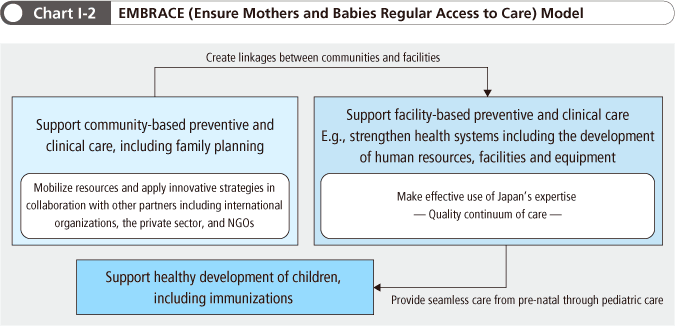Japan's Official Development Assistance White Paper 2010
Section 2 Japan's Contribution Towards Achievement of MDGs
With a view to achieving the MDGs, Japan will make contributions to international organizations and provide direct assistance to countries in areas such as health and education, so that challenged countries can be self-reliant.
1. New Global Health Policy
Japan has put emphasis on health as a global issue directly linked to human security, and has led discussions of the international community on topics such as strengthening the health system. Japan achieved the goal of the Health and Development Initiative (HDI) it announced in 2005, which was to provide comprehensive assistance amounting to US$5 billion over five years, and was completed at the end of FY2009. On this milestone year with five years left until the deadline for achieving the MDGs, Japan established the “Global Health Policy 2011– 2015” and unveiled it on the occasion of the UN Summit on the MDGs. To contribute to the achievement of health-related MDGs based on this policy, Prime Minister Kan announced that Japan will provide assistance in this area amounting to US$5 billion over five years beginning in 2011.
The new policy is a comprehensive policy on Japan’s assistance in the health sector and is comprised of three pillars: (1) Maternal and child health; (2) Combating three major infectious diseases (HIV/AIDS, tuberculosis, malaria); and (3) Responding to global public health emergencies. Under this new policy, Japan will focus efforts to resolve the challenges (bottlenecks) in achieving the health-related MDGs and carry out effective and efficient assistance.
With regards to maternal and child health — the areas in which progress has been particularly slow, Japan will enhance assistance for ensuring seamless care from prenatal to postnatal care based on the “EMBRACE”(Note 4) assistance model which Japan proposed to the international community. Specifically, Japan will extend assistance in cooperation with the international community, so that aid recipient countries can provide medical care as a package, including regular checkups for pregnant women, newborn care at hospitals with equipment and human resources, improved access to hospitals, and vaccinations. Based on this policy, Japan, in collaboration with other development partners including international organizations, aims to save the lives of 680,000 pregnant women and 11.3 million infants including 2.96 million newborns in aid recipient countries. For combating the three major infectious diseases, Japan will strengthen support particularly for the Global Fund to Fights AIDS, Tuberculosis and Malaria (Global Fund). At the UN Summit on the MDGs in September 2010 and the Global Fund’s Third Voluntary Replenishment Conference in October, Japan announced that it will contribute up to US$800 million for the coming years to the Global Fund. In addition to making further financial contributions, Japan will step up complementarity between the Global Fund’s activities and Japan’s bilateral assistance. Based on this policy, Japan aims to avert 470,000 deaths from AIDS, 990,000 deaths from tuberculosis, and 3.3 million deaths from malaria across aid recipient countries, in cooperation with other development partners.
Furthermore, Japan will provide active support in response to global public health emergencies such as pandemic influenza and polio, and various health crises due to natural disasters and conflicts. Through these activities, Japan will contribute to community stabilization and peace-building.

Notes:
(4) EMBRACE: Acronym for "Ensure Mothers and Babies Regular Access to Care"
